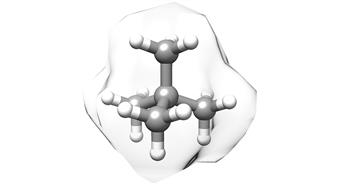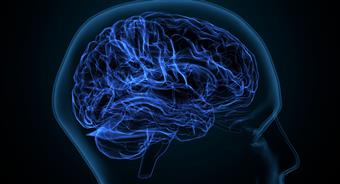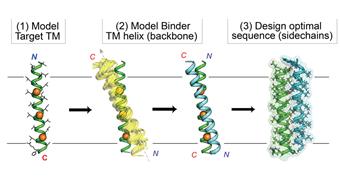
Brain receptor that regulates body heat may also help accelerate weight loss A discovery from Scripps Research shows that blocking the kappa opioid receptor while on a restricted-calorie diet could help shed pounds faster.
November 27, 2019
LA JOLLA, CA The brain mechanism that enables us to maintain a constant body temperature may also be the key to rapid weight loss, a new study finds. In experiments involving mice that were given a calorie-restricted diet, scientists at Scripps Research discovered that blocking a brain receptor that normally regulates body heat resulted in significant weight reductions.
The findings will be further explored as a potential treatment approach for obesity, which the World Health Organization has called a global epidemic. Obesity affects virtually all age and socioeconomic groups increasing risk for heart disease, stroke, diabetes, cancer and many other serious health conditions.
The new study, led by Scripps Research Professor Bruno Conti, PhD, appears in Current Biology.
Up to 50 percent of what we eat every day is used as energy to maintain body temperature, Conti says. But when food is scarce, mammals adapt by lowering their temperature, limiting energy expenditure and the loss of body weight.
Some species, he notes, can go into complete hibernation. Of course, humans don't hibernate when they're on a calorie-restricted diet, but they do naturally experience a lower body temperature just like other mammals. And that makes it harder to lose weight when on a diet.
It's a basic survival mechanism, Conti says. The body is saying: Let's save energy today and maybe we will find food tomorrow.
In a continuation of their earlier research on lifespan and aging, Conti and his team investigated the cellular mechanisms that regulate the body's cooling response to calorie restriction. Biological data obtained in collaboration with the Scripps Research lab of Gary Siuzdak, PhD, suggested the possibility that opioid compounds that naturally occur within the body could be mediating these effects.
Next, the team tested whether blocking the activity of opioid receptors would affect body temperature during calorie restriction. It did. They also determined that this mechanism was uniquely regulated by one of the three known opioid receptor types: the kappa opioid receptor. The finding made sense, as the kappa receptor is the most abundant opioid receptor in the hypothalamus, the part of the brain already known to play a role in regulating both body temperature and feeding.
Conti's team then wondered if by blocking the kappa receptor, the body would continue to burn up calories to regulate heat even when food was restricted. We developed an experimental protocol that would allow us to determine what changes were happening as a result of body heat regulation, not diet, says Rigo Cintron-Colon, PhD, first author of the study.
In one set of experiments, the scientists observed two groups of lean mice that had already been on calorie-restricted diets for six weeks. One group was then treated with a drug to block the kappa receptor. The control group had adapted to the new diet and weight loss plateaued, while the experimental group showed greater energy expenditure and lost an additional 6 percent of body weight.
When we blocked the kappa receptor, the animals did not lower their temperature during calorie restriction and lost more body weight, Conti says.
Similar results were obtained with mice that had developed diet-induced obesity. Blocking the kappa opioid receptor during calorie restriction nearly doubled the body weight loss that the obese animals would normally undergo if the receptor was functional. However, when animals were allowed to eat freely, blocking the kappa opioid receptor had no effects on body temperature and did not alter the normal rate of body weight loss.
This is important, Conti says, as it tells us that kappa opioid blockers are effective in both lean mice and obese mice, but that the medicine is able to affect body weight only in animals that are dieting.
The findings suggest a possibility that by translating these findings into humans, a pharmaceutical product may be able to help those who are struggling to lose weight, despite their adherence to a calorie-restricted diet. As a next step, Conti would like to explore whether existing medicines that are known to block the kappa receptor could be repurposed and refined to safely treat obesity.
The tools to interact with this mechanism may already be available, and if they are, they may be able to translate quickly into a medicine, he says. Unfortunately for many people who are obese, losing weight isn't as simple as eating less.
Authors of the article, Activation of Kappa Opioid Receptor Regulates the Hypothermic Response to Calorie Restriction and Limits Body Weight Loss, include Rigo Cintron-Colon, Christopher W. Johnson, J. Rafael Montenegro-Burke, Carlos Guijas, Lila Faulhaber, Manuel Sanchez-Alavez, Carlos A. Aguirre, Kokila Shankar, Mona Singh, Andrea Galmozzi, Gary Siuzdak, Enrique Saez and Bruno Conti.
This work was supported by the National Institutes of Health (GM113894, RC2 DK114785, R01 GM114368-03, P30 MH062261-17, P01 DA026146-02) and the Cloud Credits Model Pilot, a component of the NIH Big Data to Knowledge program.
Diabetes, Obesity and Metabolic Disorders Conti, Bruno
More from Scripps
20/04/2024
New copper-catalyzed C-H activation strategy from Scripps Research Two-mode reactions inspired by human detox enzymes offer powerful new tools for drug discover...
12/04/2024
Scripps Research chemists devise easier new method for making a common type of building block for drugs Scientists transform simple linear amines into saturated...
06/04/2024
A simple, inexpensive way to make carbon atoms bind together A Scripps Research team uncovers a cost-effective method for producing quaternary carbon molecules,...
04/04/2024
Developing a vaccine for the zombie drug xylazine Scripps Research chemical biologists design an early proof-of-concept vaccine that could lead to the first...
30/03/2024
How blocking a neural receptor responsible for addiction could reduce alcohol use A Scripps Research team found that a new therapeutic that targets the kappa op...
13/03/2024
New computational strategy boosts the ability of drug designers to target proteins inside the membrane Customized-design approach could streamline the design of...
29/02/2024
Scripps Research scientists reveal how first cells could have formed on Earth New phospholipid discovery brings researchers closer to understanding how primordi...
29/02/2024
How molecular handedness emerged in early biology Scripps Research chemists fill a major gap in origin-of-life theories.
February 28, 2024
LA JOLLA, CA Mole...
22/02/2024
Snaking toward a universal antivenom Scripps Research scientists discovered antibodies that protect against a host of lethal snake venoms.
February 21, 2024
...
06/02/2024
Calibr-Skaggs announces expansion of option and license agreement with AbbVie to develop novel cell therapies for solid tumors and autoimmune diseases
AbbVie...
26/01/2024
Re-energizing mitochondria to treat Alzheimer's disease Scripps Research team restored neuron-to-neuron connections in human cells.
January 25, 2024
LA JO...
24/01/2024
100 years of Science Changing Life: Scripps Research celebrates a century of transforming human health For the last century, institute leaders and renowned scie...
23/01/2024
New technology lets researchers track brain cells' off switches The method could shed light on what goes awry in numerous brain conditions when neurons ar...
09/01/2024
Three decades of giving: Announcing the Calibr-Skaggs Institute for Innovative Medicines The ALSAM Foundation, founded by the Skaggs family, provides lasting g...
04/01/2024
Life science entrepreneur Gene Lay joins Scripps Research Board of Directors Lay, founder of the global biotech company BioLegend, brings invaluable experience ...
21/12/2023
Taming a plant-derived toxin Scripps Research team modifies the traditional poison picrotoxinin for potential neurological drugs and anti-parasite treatments. ...
19/12/2023
Scripps Research Executive Vice President Eric Topol gives TED talk on transformative power of AI in medicine Topol provides an overview of how AI models can i...
13/12/2023
New AI-powered algorithm could better assess people's risk of common heart condition Early detection of atrial fibrillation can reduce the risk of stroke an...
07/12/2023
Nanoparticle flu vaccine design shows promise in early tests Scripps Research-designed vaccine could provide broad, enduring protection against influenza A str...
16/11/2023
Numerous Scripps Research scientists named Highly Cited Researchers Clarivate's annual, global list represents researchers who have demonstrated significant...
07/11/2023
Multiple sclerosis drug invented at Scripps Research slows long-term devastating disease progression Late-breaking data reinforces the effectiveness and safety ...
05/10/2023
Keren Lasker named a 2023 Moore Inventor Fellow The prestigious award will support Lasker's inventive research in membraneless organelles and their applica...
22/09/2023
Michael Bollong named a 2023 Amgen Young Investigator The prestigious award will support Bollong's research identifying new molecular targets and therapeuti...
09/09/2023
Philip Dawson receives 2024 American Chemical Society National Award Dawson is honored with the Arthur C. Cope Late Careers Scholar Award for his foundational c...
07/09/2023
Scripps Research chemists devise a method for C-H activation of alcohols The method represents a new toolkit for making drugs and other compounds.
September 06...
31/08/2023
Scripps Research receives $1.5M to surveil infectious disease threats in wastewater Bill & Melinda Gates Foundation award to support the development of multi-pa...
16/08/2023
How cold temperatures trigger the brain to boost appetite Scripps Research scientists' discovery could lead to new weight loss and metabolic health treatmen...
08/08/2023
Human antibody that targets carfentanil, fentanyl and related opioids reverses overdose effects in preclinical study Scripps Research-developed antibody therapy...
04/08/2023
How sensory neurons impact the gut Scripps Research scientists show that the receptor PIEZO2 in sensory neurons controls gut motility and transit time, which a...
26/07/2023
AbbVie and Calibr Expand Strategic Collaboration to Advance Several Preclinical and Early-stage Clinical Assets The expanded strategic collaboration will advan...
23/07/2023
Scripps Research scientists develop AI-based tracking and early-warning system for viral pandemics Machine-learning system effectively predicts emergence of pro...
19/07/2023
Monitoring T cells may allow prevention of type 1 diabetes Scripps Research study shows that analyzing T cells in blood samples could be used to select at-risk ...
19/07/2023
Scripps Research mourns passing of leading organic chemist Albert Eschenmoser Eschenmoser pioneered key reactions in synthetic chemistry and shaped the understa...
15/06/2023
Scripps Research awarded $46.8 million by NIH to promote human health through innovative translational science and training The Translational Institute is harne...
13/06/2023
Scripps Research's Danielle Grotjahn named 2023 Pew Scholar in the Biomedical Sciences The award will support Grotjahn's study of how cells assemble the...
31/05/2023
Crossing the ring: new method enables C-H activation across saturated carbocycles Scripps Research chemists add another powerful tool to their molecular editin...
24/05/2023
Scripps Research develops behind-the-scenes tool for better biomedical data discovery The new resource makes datasets more discoverable for life science communi...
19/05/2023
Scripps Research neuroscientist Hollis Cline elected to American Academy of Arts and Sciences Cline is recognized for her discoveries about the role of sensory ...
19/05/2023
Scripps Research's Skaggs Graduate School awards doctoral degrees to 31st graduating class Commencement ceremony will be livestreamed via Zoom and on instit...
13/05/2023
A better route to benzocyclobutenes, sought-after building blocks for drugs Scripps Research chemists devise a new, C-H activation-based method for the synthesi...
09/05/2023
Renowned Scripps Research professor Jeffery Kelly elected to National Academy of Sciences Kelly's groundbreaking work on protein misfolding has led to thera...
28/04/2023
Mirror-image molecules pave new path for cancer drug discovery By comparing how mirror image versions of small molecules impact clusters of proteins, Scripps R...
22/04/2023
How alcohol consumption contributes to chronic pain A Scripps Research team showed how both alcohol intake and alcohol withdrawal can lead to increased pain and...
21/04/2023
Xin Jin receives dual awards to study autism risk genes in neurodevelopment Major grants from the National Institutes of Health and California Institute for Reg...
20/04/2023
Trim the sugar: New HIV vaccine design improves immune response Scripps Research vaccine candidate headed for clinical trials.
April 19, 2023
LA JOLLA, CA A...
18/04/2023
Therapeutic can seek and destroy potent opioid to treat overdoses Scripps Research chemists developed a new biologic to work against the synthetic opioid carfen...
07/03/2023
How heavy alcohol consumption increases brain inflammation The findings by a Scripps Research team point toward a potential new drug target for treating alcohol...
02/03/2023
Scientists find human antibodies that can block multiple coronaviruses including SARS-CoV-2 Results from a Scripps Research and UNC team pave the way for a vacc...
28/02/2023
$10 million grant funds Scripps Research Alcohol Research Center through its 50th year The five-year grant supports research into the neurobiology of alcohol us...
28/02/2023
Immune system drug shows promise in treating alcohol use disorder, a Scripps Research clinical trial reports Scientists at Scripps Research found that apremilas...
 Brain receptor that regulates body heat may also help accelerate weight loss A discovery from Scripps Research shows that blocking the kappa opioid receptor while on a restricted-calorie diet could help shed pounds faster.
Brain receptor that regulates body heat may also help accelerate weight loss A discovery from Scripps Research shows that blocking the kappa opioid receptor while on a restricted-calorie diet could help shed pounds faster.























